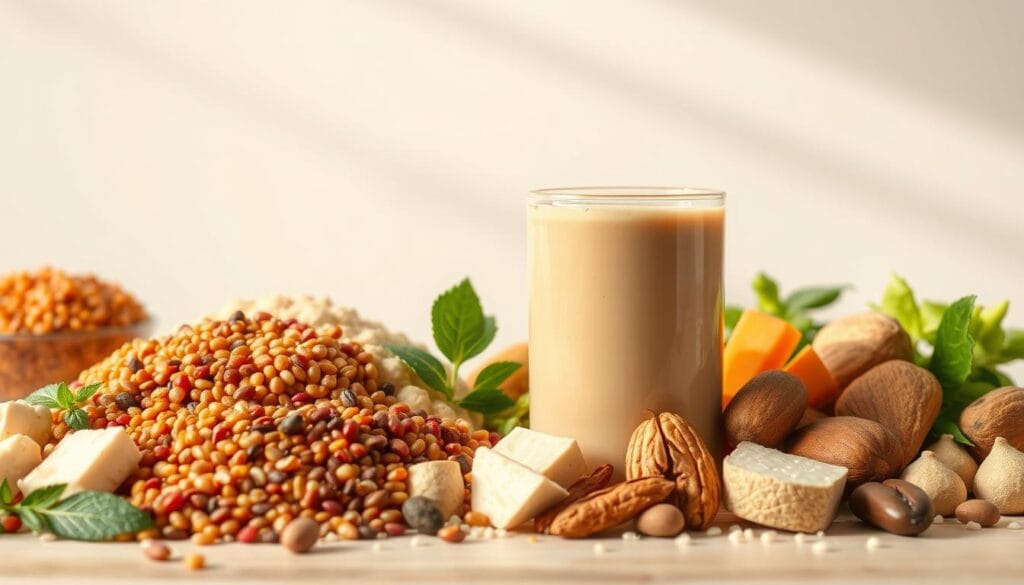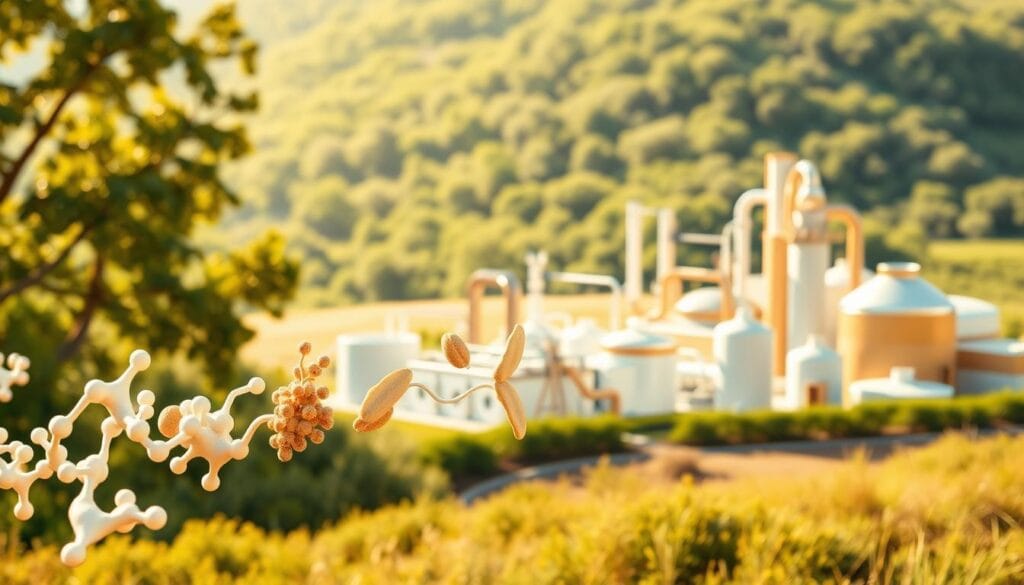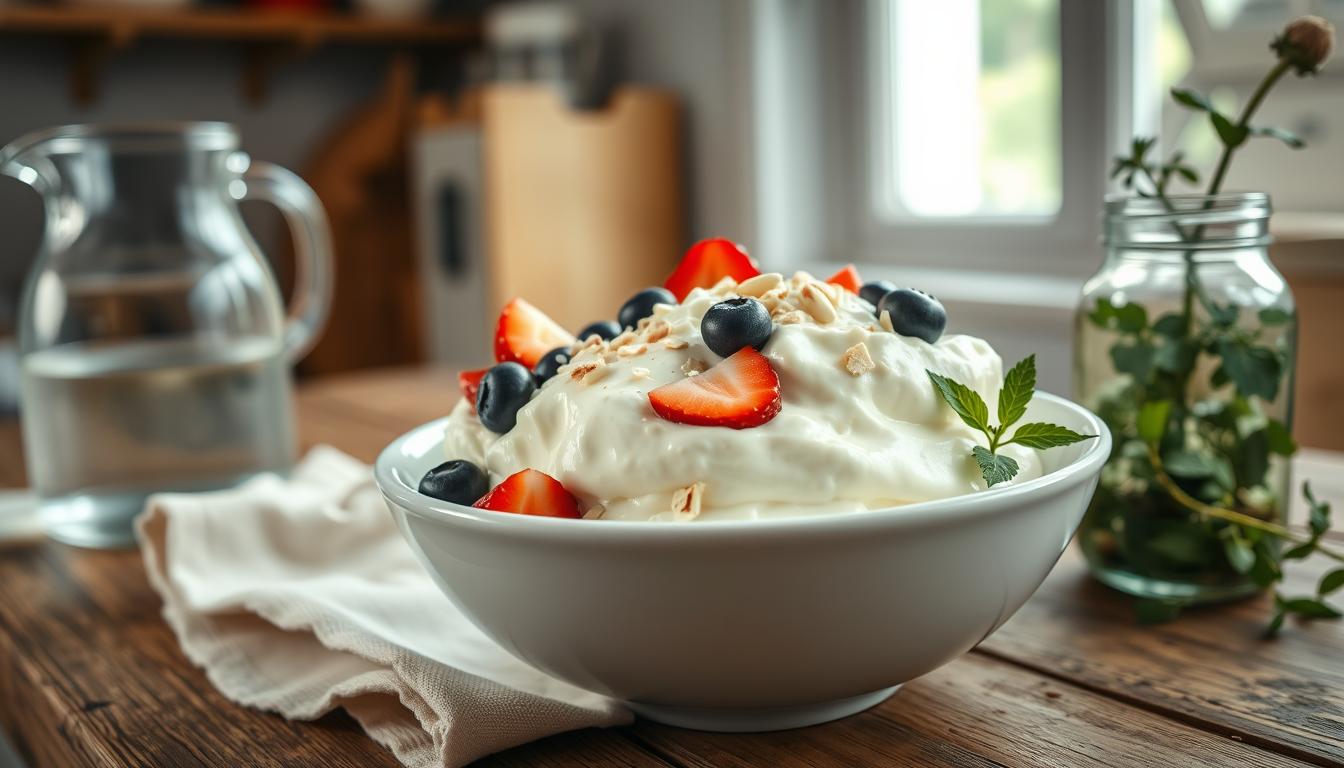Explore the exciting world of plant-based protein that’s changing the game for health lovers. Vegan diet whey protein is more than a trend. It’s a smart way to boost your health without losing flavor or effectiveness.
Recent studies show that plant-based protein has all the amino acids your body needs. This is true for athletes, fitness fans, or anyone wanting the best nutrition. Vegan protein is a green and nutritious choice compared to animal-based proteins.
Companies like Vega, KOS, and Garden of Life are at the forefront. They make protein powders with 20-30 grams of protein per scoop. Plus, they add extra nutrients to help your body stay healthy.
Table of Contents
Understanding Plant-Based Protein Basics
Exploring vegan protein supplements opens up a world of nutrition. Starting with dairy-free protein powder, you learn how plant-based proteins change your diet.

Plant proteins have special benefits. They can give you all the nutrients you need when mixed right.
The Science Behind Protein Absorption
How your body absorbs protein changes with each source. Plant proteins digest slowly, helping muscles grow longer.
- Pea protein isolate provides up to 85% protein by weight
- Rice protein offers around 70-80% protein concentration
- Plant proteins are often blended to achieve complete amino acid profiles
Essential Amino Acids in Plant Proteins
Your body needs nine essential amino acids from food. While single plant proteins might not have them all, mixing them does.
| Protein Source | Protein Concentration | Key Benefits |
|---|---|---|
| Pea Protein | 85% | Easily digestible, hypoallergenic |
| Rice Protein | 70-80% | Low allergen potential |
| Blended Plant Protein | Complete Profile | Comprehensive amino acid coverage |
Daily Protein Requirements for Vegans
The daily protein need is 0.8 grams per kilogram of body weight. A vegan diet can meet this with various plant proteins.
Knowing these basics lets you add vegan protein to your diet. This ensures you stay healthy and perform well.
The Evolution of Vegan Diet Whey Protein

The world of plant protein isolate has changed a lot in the last ten years. What was once a small market for vegan alternatives is now a big and exciting choice for those who care about their health.
Plant-based protein powders have seen big improvements. Scientists and nutrition experts have found new ways to make these proteins better in taste and quality. Some key changes include:
- Enhanced protein extraction techniques
- Improved amino acid profile matching
- Better flavor and texture optimization
Now, vegan protein supplements come from many sources. This makes them more complete and nutritious. Pea, rice, hemp, and soy proteins are mixed together to give you a full protein experience, just like traditional whey.
New ways of making these proteins have fixed old problems. Today’s vegan options are:
- Higher in protein
- Easier to digest
- Have a better mix of amino acids
People wanting better options have pushed for these changes. With 11% of North Americans eating vegan or vegetarian, the demand for top-notch plant protein is growing fast.
Benefits of Plant-Based Protein Supplements
Exploring vegan athlete supplements shows a strong nutrition plan. Plant-based protein powders help with health, performance, and the planet. They can change your fitness path.
Vegan protein shakes are more than a trend. They are a smart choice for athletes and those who care about health. These supplements offer many benefits beyond just protein.
Muscle Recovery and Growth
Plant-based proteins don’t hold back muscle growth. Mixing proteins like pea and rice gives you all the amino acids needed. This is key for muscle repair and growth.
- Complete protein source with essential amino acids
- Supports muscle protein synthesis
- Faster recovery after intense workouts
Digestive Health Advantages
Vegan protein powders offer digestive perks. They often have digestive enzymes and lots of fiber. These help your gut and make nutrients easier to absorb.
- Reduced inflammation
- Improved gut microbiome
- Enhanced nutrient absorption
Environmental Impact Benefits
Choosing a vegan protein shake is good for you and the planet. Plant-based proteins need less land, water, and produce less pollution than animal proteins.
| Environmental Aspect | Plant Protein Impact | Animal Protein Impact |
|---|---|---|
| Land Use | Minimal | Extensive |
| Water Consumption | Low | High |
| Greenhouse Gas Emissions | Reduced | Significant |
Choosing a top vegan athlete supplement is good for your health and the planet. Your choice impacts you and the world positively.
Common Sources of Plant-Based Protein
Exploring different protein sources is key for those on a cruelty-free diet. You can find a wide range of nutritious foods that are high in protein. These foods are great for your plant-based protein journey.
Legumes are top protein sources in the plant world. Here are some high-protein options:
- Red kidney beans: 14 grams per cup
- Chickpeas: 14.5 grams per cup
- Black-eyed peas: 12 grams per cup
- Edamame: 13.5 grams per cup
Seeds and grains are also great for protein. Quinoa has about 8 grams of protein per cooked cup. Hemp seeds give you 10 grams of protein in just three tablespoons.
Plant-based protein powders usually have 8 grams of protein per serving. They’re a handy way to get more protein. Nutritional yeast is also a great source, with 8 grams per serving.
It’s important to mix different plant proteins to get all amino acids. This ensures your body gets what it needs.
Comparing Different Vegan Protein Types
Finding the right vegan protein can be tough. Each plant-based protein has its own benefits for those who need dairy-free options. Knowing the differences helps you pick the best one for your diet.
Plant proteins differ a lot in amino acids and how well they digest. Let’s look at the top vegan protein sources:
Pea Protein: The Muscle Builder
Pea protein is a strong choice for vegan protein. It has:
- High in branched-chain amino acids
- Easily digestible
- Helps muscles recover
- Has about 20-25 grams of protein per serving
Hemp Protein: The Nutrient Powerhouse
Hemp protein is packed with nutrients for your dairy-free needs:
- Rich in omega-3 and omega-6 fatty acids
- Complete amino acid profile
- More fiber
- Good for heart and brain health
Rice Protein: The Hypoallergenic Option
Rice protein is great for those with sensitive stomachs:
- Hypoallergenic
- Easily digestible
- Less chance of allergic reactions
- Helps with muscle growth
Comparative Protein Analysis
| Protein Type | Protein per Serving | Key Benefits |
|---|---|---|
| Pea Protein | 20-25g | Muscle recovery, high BCAA |
| Hemp Protein | 15-20g | Omega fatty acids, complete protein |
| Rice Protein | 15-22g | Hypoallergenic, gentle digestion |
Choosing the right vegan protein depends on your needs and goals. Try different types to find the best dairy-free protein for you.
Optimizing Protein Absorption in Your Diet
To get the most from vegan whey alternatives and plant protein isolates, plan your nutrition carefully. How well your body absorbs protein affects muscle recovery and health. Several factors can influence this process.
- Combine different plant protein sources to create a complete amino acid profile
- Space protein intake every 3-4 hours for optimal muscle protein synthesis
- Include digestive enzymes to enhance nutrient breakdown
- Maintain proper hydration for efficient protein absorption
Research shows that most protein absorption happens in the small intestine. Enterocytes are key in breaking down proteins into amino acids your body can use. Generally, your digestive system can process about 90% of the protein you eat well.
| Absorption Factor | Impact on Protein Utilization |
|---|---|
| Digestive Enzymes | Can increase protein absorption by 20-30% |
| Hydration Levels | Mild dehydration reduces nutrient absorption |
| Meal Composition | High-fat meals can slow protein digestion by up to 30% |
When picking a vegan whey alternative, choose plant protein isolates with a full amino acid profile. Mixing proteins like pea and rice ensures you get all the amino acids your muscles need for recovery and nutrition.
Integrating Vegan Protein into Daily Meals
Using vegan protein all day can help your muscles grow and keep you healthy. Spreading out your protein intake helps your body absorb it better. This supports your fitness goals as a vegan athlete.
Creative Breakfast Protein Options
Begin your day with a vegan protein shake that boosts your energy. Here are some high-protein breakfast ideas:
- Overnight oats with chia seeds and pea protein powder
- Tofu scramble with nutritional yeast
- Quinoa porridge topped with almonds
- Smoothie blending spinach, banana, and vegan athlete supplement
Post-Workout Nutrition Strategies
What you eat after working out is key for muscle recovery. A quick vegan protein shake can give you the amino acids you need within 30 minutes after your workout.
| Protein Source | Protein per Serving |
|---|---|
| Pea Protein Powder | 25g |
| Hemp Protein Shake | 15g |
| Tofu | 20g |
Evening Protein Intake Recommendations
Protein at night helps repair and grow your muscles. Light snacks like tempeh bites or a small vegan protein shake can meet your needs without keeping you awake.
“Consistency in protein intake is key to supporting your vegan fitness journey.” – Nutrition Experts
Conclusion: Embracing the Vegan Protein Revolution
Your journey into vegan nutrition is more than just a diet. It’s a change that improves your health and helps the planet. Cruelty-free protein powder is a great way to meet your nutritional needs and reach your wellness goals. It helps lower disease risks, supports muscle growth, and keeps your body in top shape.
Plant-based proteins are proven to be good for your health. They can lower heart disease risks and improve digestion. They offer many benefits for wellness. Athletes and health lovers can use these proteins to perform better without harming the environment.
Choosing plant-based nutrition is a smart choice for your health. Cruelty-free protein powder is backed by science and supports both your health and the planet. As more research shows the benefits of vegan proteins, you’re at the forefront of a healthy change.
Your food choices have a big impact. By picking plant-based proteins, you’re not just feeding your body. You’re also joining a movement towards a more conscious and sustainable life. The future of food is plant-based, and you’re leading the way.


